Understanding Tourism Consumer Behaviour & Decision-Making Process
VerifiedAdded on 2023/01/19
|13
|3917
|69
Report
AI Summary
This report provides a comprehensive analysis of consumer behavior in the tourism sector, focusing on the factors influencing consumer decisions and the impact of digital technology. It explores cultural, social, psychological, and personal factors that shape consumer behavior, highlighting how these factors affect travel choices. The report also examines the stages of the consumer decision-making process, from initial need recognition to post-purchase evaluation, and emphasizes the importance for marketers to understand these stages. A comparison is made between B2B and B2C decision-making processes within the tourism industry, alongside a discussion of various market research approaches. The report evaluates the stages of tourism decision-making, considering the influence of marketers and technological advancements, particularly in the context of TUI UK Ireland's strategies for attracting and retaining customers through online platforms and integrated payment systems. This analysis offers valuable insights for tourism organizations aiming to enhance their understanding of consumer behavior and improve their marketing strategies.
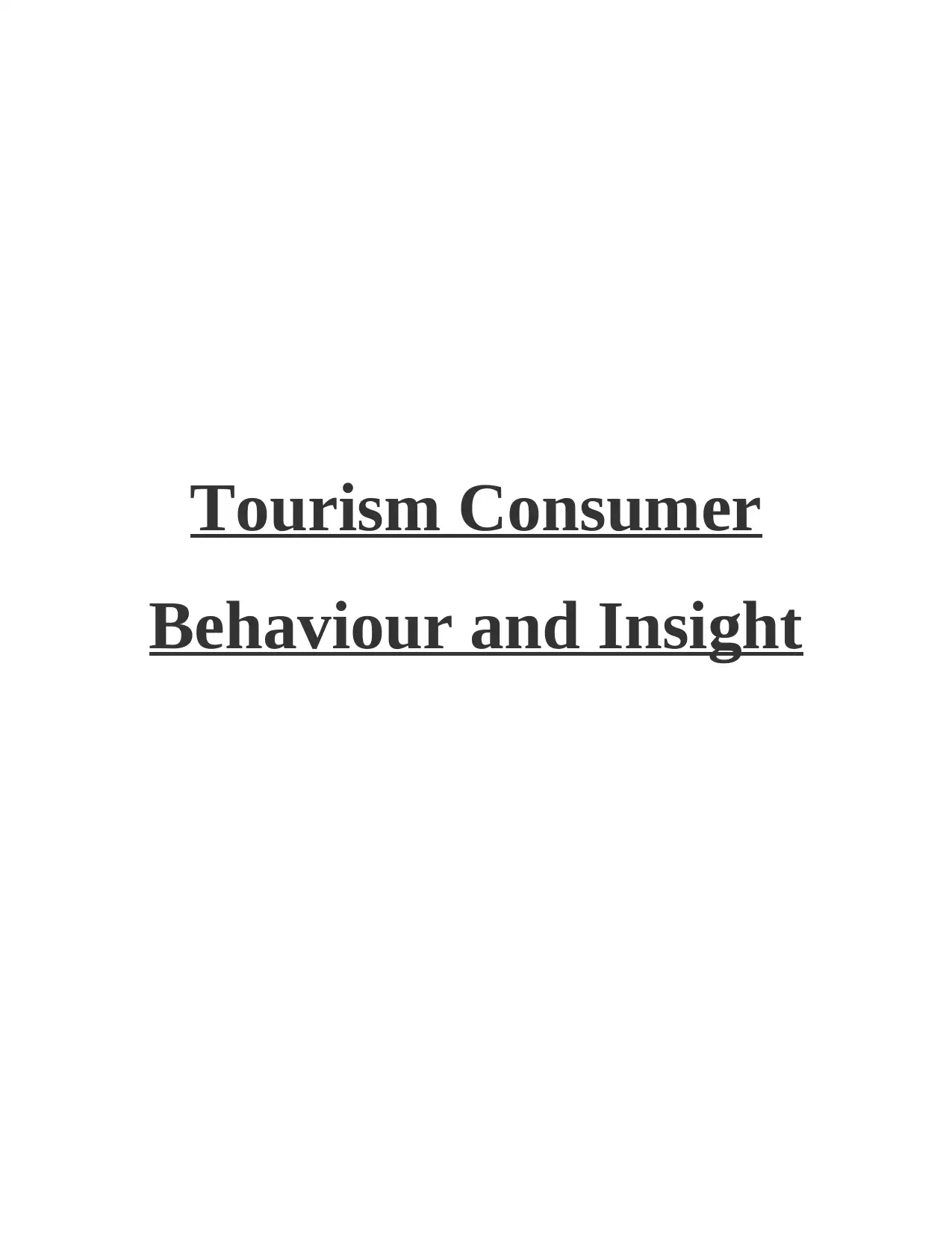
Tourism Consumer
Behaviour and Insight
Behaviour and Insight
Paraphrase This Document
Need a fresh take? Get an instant paraphrase of this document with our AI Paraphraser
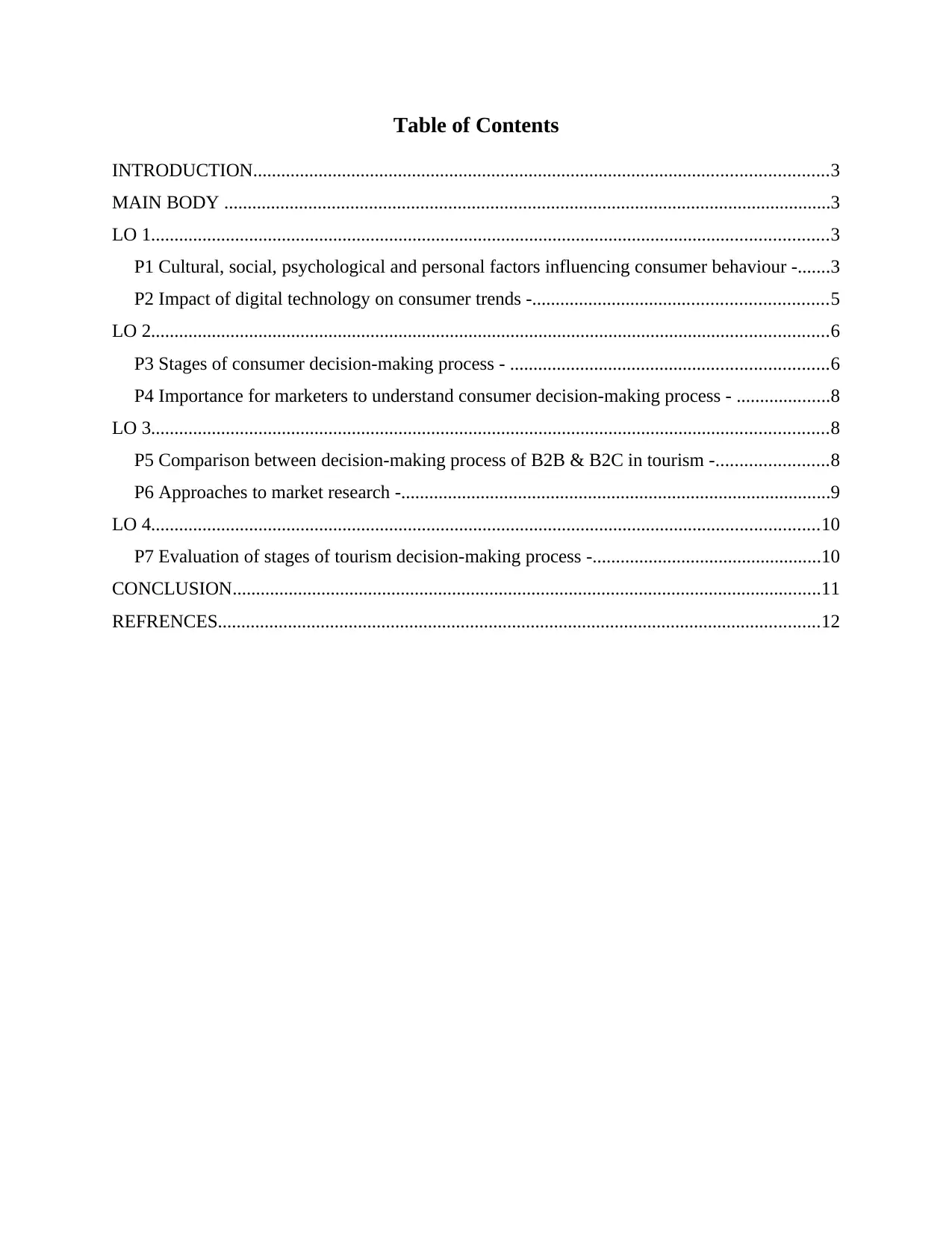
Table of Contents
INTRODUCTION...........................................................................................................................3
MAIN BODY ..................................................................................................................................3
LO 1.................................................................................................................................................3
P1 Cultural, social, psychological and personal factors influencing consumer behaviour -.......3
P2 Impact of digital technology on consumer trends -...............................................................5
LO 2.................................................................................................................................................6
P3 Stages of consumer decision-making process - ....................................................................6
P4 Importance for marketers to understand consumer decision-making process - ....................8
LO 3.................................................................................................................................................8
P5 Comparison between decision-making process of B2B & B2C in tourism -........................8
P6 Approaches to market research -............................................................................................9
LO 4...............................................................................................................................................10
P7 Evaluation of stages of tourism decision-making process -.................................................10
CONCLUSION..............................................................................................................................11
REFRENCES.................................................................................................................................12
INTRODUCTION...........................................................................................................................3
MAIN BODY ..................................................................................................................................3
LO 1.................................................................................................................................................3
P1 Cultural, social, psychological and personal factors influencing consumer behaviour -.......3
P2 Impact of digital technology on consumer trends -...............................................................5
LO 2.................................................................................................................................................6
P3 Stages of consumer decision-making process - ....................................................................6
P4 Importance for marketers to understand consumer decision-making process - ....................8
LO 3.................................................................................................................................................8
P5 Comparison between decision-making process of B2B & B2C in tourism -........................8
P6 Approaches to market research -............................................................................................9
LO 4...............................................................................................................................................10
P7 Evaluation of stages of tourism decision-making process -.................................................10
CONCLUSION..............................................................................................................................11
REFRENCES.................................................................................................................................12
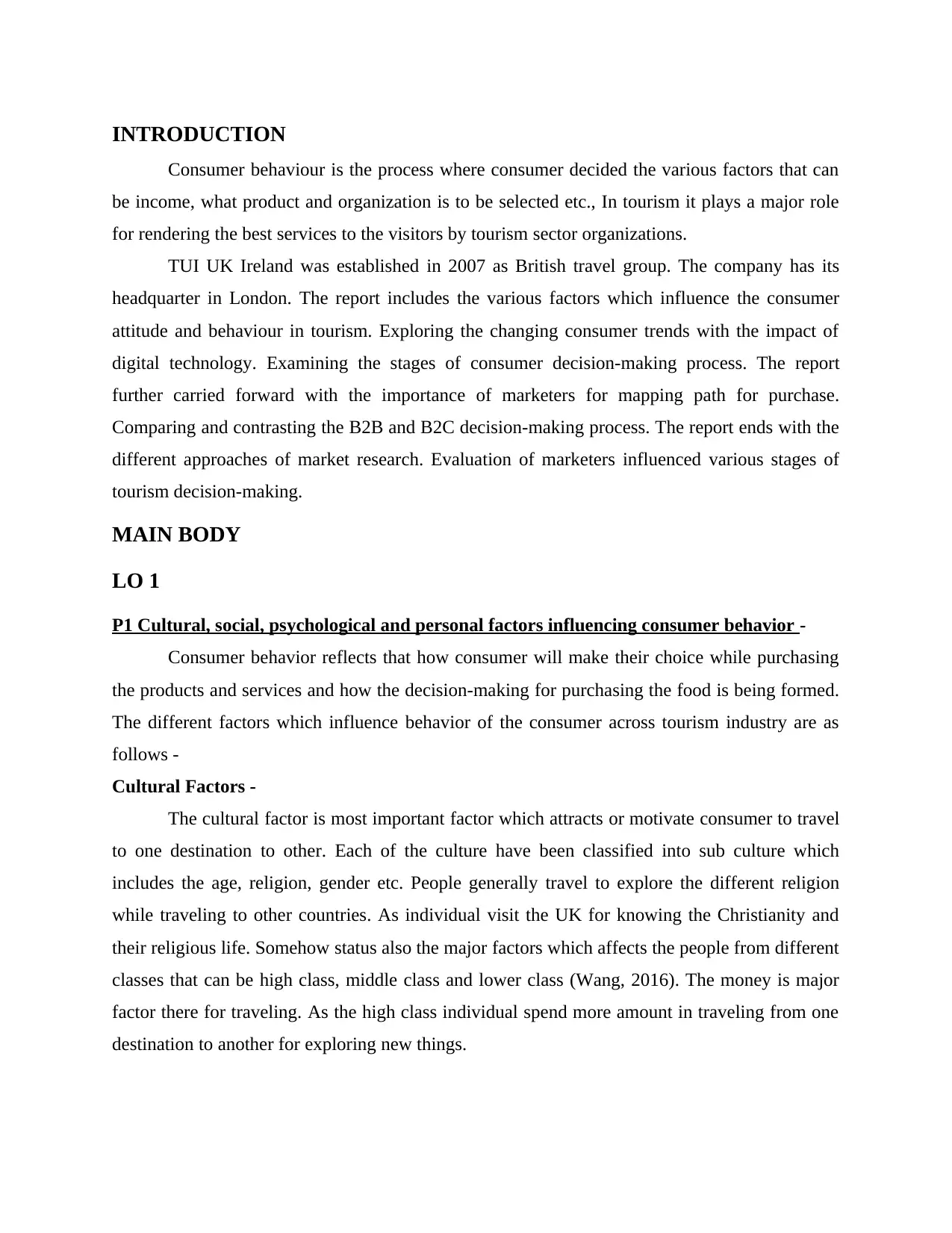
INTRODUCTION
Consumer behaviour is the process where consumer decided the various factors that can
be income, what product and organization is to be selected etc., In tourism it plays a major role
for rendering the best services to the visitors by tourism sector organizations.
TUI UK Ireland was established in 2007 as British travel group. The company has its
headquarter in London. The report includes the various factors which influence the consumer
attitude and behaviour in tourism. Exploring the changing consumer trends with the impact of
digital technology. Examining the stages of consumer decision-making process. The report
further carried forward with the importance of marketers for mapping path for purchase.
Comparing and contrasting the B2B and B2C decision-making process. The report ends with the
different approaches of market research. Evaluation of marketers influenced various stages of
tourism decision-making.
MAIN BODY
LO 1
P1 Cultural, social, psychological and personal factors influencing consumer behavior -
Consumer behavior reflects that how consumer will make their choice while purchasing
the products and services and how the decision-making for purchasing the food is being formed.
The different factors which influence behavior of the consumer across tourism industry are as
follows -
Cultural Factors -
The cultural factor is most important factor which attracts or motivate consumer to travel
to one destination to other. Each of the culture have been classified into sub culture which
includes the age, religion, gender etc. People generally travel to explore the different religion
while traveling to other countries. As individual visit the UK for knowing the Christianity and
their religious life. Somehow status also the major factors which affects the people from different
classes that can be high class, middle class and lower class (Wang, 2016). The money is major
factor there for traveling. As the high class individual spend more amount in traveling from one
destination to another for exploring new things.
Consumer behaviour is the process where consumer decided the various factors that can
be income, what product and organization is to be selected etc., In tourism it plays a major role
for rendering the best services to the visitors by tourism sector organizations.
TUI UK Ireland was established in 2007 as British travel group. The company has its
headquarter in London. The report includes the various factors which influence the consumer
attitude and behaviour in tourism. Exploring the changing consumer trends with the impact of
digital technology. Examining the stages of consumer decision-making process. The report
further carried forward with the importance of marketers for mapping path for purchase.
Comparing and contrasting the B2B and B2C decision-making process. The report ends with the
different approaches of market research. Evaluation of marketers influenced various stages of
tourism decision-making.
MAIN BODY
LO 1
P1 Cultural, social, psychological and personal factors influencing consumer behavior -
Consumer behavior reflects that how consumer will make their choice while purchasing
the products and services and how the decision-making for purchasing the food is being formed.
The different factors which influence behavior of the consumer across tourism industry are as
follows -
Cultural Factors -
The cultural factor is most important factor which attracts or motivate consumer to travel
to one destination to other. Each of the culture have been classified into sub culture which
includes the age, religion, gender etc. People generally travel to explore the different religion
while traveling to other countries. As individual visit the UK for knowing the Christianity and
their religious life. Somehow status also the major factors which affects the people from different
classes that can be high class, middle class and lower class (Wang, 2016). The money is major
factor there for traveling. As the high class individual spend more amount in traveling from one
destination to another for exploring new things.
⊘ This is a preview!⊘
Do you want full access?
Subscribe today to unlock all pages.

Trusted by 1+ million students worldwide
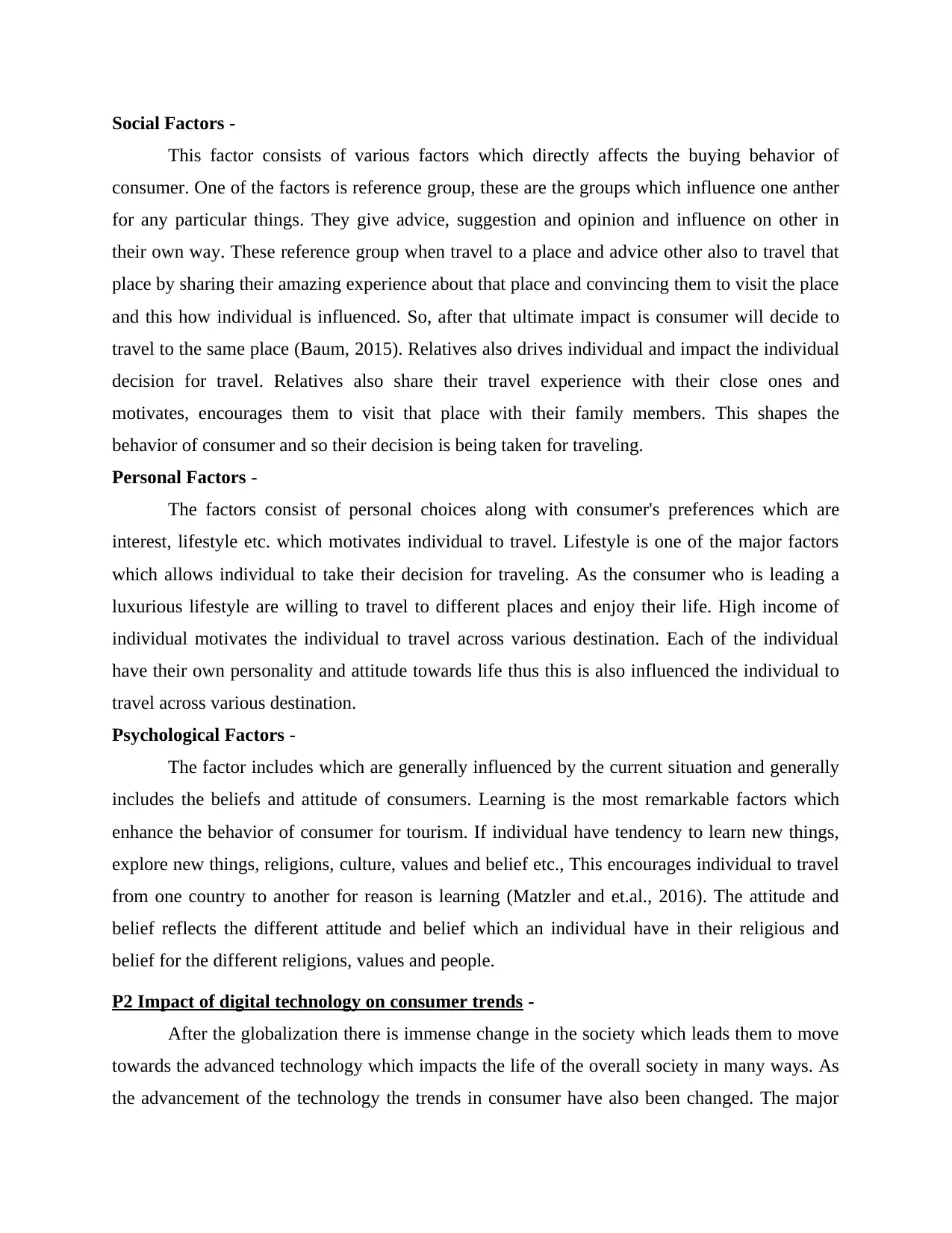
Social Factors -
This factor consists of various factors which directly affects the buying behavior of
consumer. One of the factors is reference group, these are the groups which influence one anther
for any particular things. They give advice, suggestion and opinion and influence on other in
their own way. These reference group when travel to a place and advice other also to travel that
place by sharing their amazing experience about that place and convincing them to visit the place
and this how individual is influenced. So, after that ultimate impact is consumer will decide to
travel to the same place (Baum, 2015). Relatives also drives individual and impact the individual
decision for travel. Relatives also share their travel experience with their close ones and
motivates, encourages them to visit that place with their family members. This shapes the
behavior of consumer and so their decision is being taken for traveling.
Personal Factors -
The factors consist of personal choices along with consumer's preferences which are
interest, lifestyle etc. which motivates individual to travel. Lifestyle is one of the major factors
which allows individual to take their decision for traveling. As the consumer who is leading a
luxurious lifestyle are willing to travel to different places and enjoy their life. High income of
individual motivates the individual to travel across various destination. Each of the individual
have their own personality and attitude towards life thus this is also influenced the individual to
travel across various destination.
Psychological Factors -
The factor includes which are generally influenced by the current situation and generally
includes the beliefs and attitude of consumers. Learning is the most remarkable factors which
enhance the behavior of consumer for tourism. If individual have tendency to learn new things,
explore new things, religions, culture, values and belief etc., This encourages individual to travel
from one country to another for reason is learning (Matzler and et.al., 2016). The attitude and
belief reflects the different attitude and belief which an individual have in their religious and
belief for the different religions, values and people.
P2 Impact of digital technology on consumer trends -
After the globalization there is immense change in the society which leads them to move
towards the advanced technology which impacts the life of the overall society in many ways. As
the advancement of the technology the trends in consumer have also been changed. The major
This factor consists of various factors which directly affects the buying behavior of
consumer. One of the factors is reference group, these are the groups which influence one anther
for any particular things. They give advice, suggestion and opinion and influence on other in
their own way. These reference group when travel to a place and advice other also to travel that
place by sharing their amazing experience about that place and convincing them to visit the place
and this how individual is influenced. So, after that ultimate impact is consumer will decide to
travel to the same place (Baum, 2015). Relatives also drives individual and impact the individual
decision for travel. Relatives also share their travel experience with their close ones and
motivates, encourages them to visit that place with their family members. This shapes the
behavior of consumer and so their decision is being taken for traveling.
Personal Factors -
The factors consist of personal choices along with consumer's preferences which are
interest, lifestyle etc. which motivates individual to travel. Lifestyle is one of the major factors
which allows individual to take their decision for traveling. As the consumer who is leading a
luxurious lifestyle are willing to travel to different places and enjoy their life. High income of
individual motivates the individual to travel across various destination. Each of the individual
have their own personality and attitude towards life thus this is also influenced the individual to
travel across various destination.
Psychological Factors -
The factor includes which are generally influenced by the current situation and generally
includes the beliefs and attitude of consumers. Learning is the most remarkable factors which
enhance the behavior of consumer for tourism. If individual have tendency to learn new things,
explore new things, religions, culture, values and belief etc., This encourages individual to travel
from one country to another for reason is learning (Matzler and et.al., 2016). The attitude and
belief reflects the different attitude and belief which an individual have in their religious and
belief for the different religions, values and people.
P2 Impact of digital technology on consumer trends -
After the globalization there is immense change in the society which leads them to move
towards the advanced technology which impacts the life of the overall society in many ways. As
the advancement of the technology the trends in consumer have also been changed. The major
Paraphrase This Document
Need a fresh take? Get an instant paraphrase of this document with our AI Paraphraser
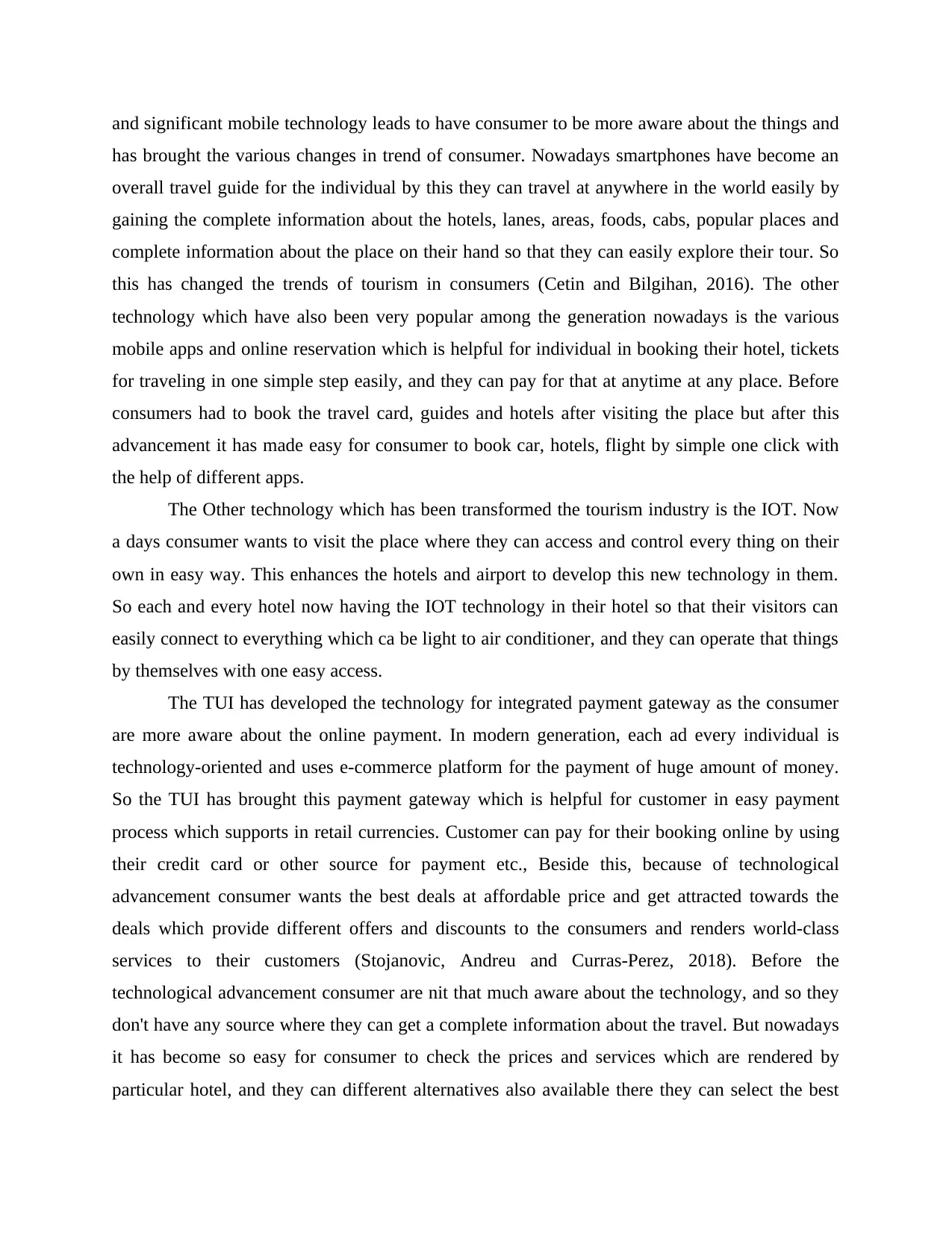
and significant mobile technology leads to have consumer to be more aware about the things and
has brought the various changes in trend of consumer. Nowadays smartphones have become an
overall travel guide for the individual by this they can travel at anywhere in the world easily by
gaining the complete information about the hotels, lanes, areas, foods, cabs, popular places and
complete information about the place on their hand so that they can easily explore their tour. So
this has changed the trends of tourism in consumers (Cetin and Bilgihan, 2016). The other
technology which have also been very popular among the generation nowadays is the various
mobile apps and online reservation which is helpful for individual in booking their hotel, tickets
for traveling in one simple step easily, and they can pay for that at anytime at any place. Before
consumers had to book the travel card, guides and hotels after visiting the place but after this
advancement it has made easy for consumer to book car, hotels, flight by simple one click with
the help of different apps.
The Other technology which has been transformed the tourism industry is the IOT. Now
a days consumer wants to visit the place where they can access and control every thing on their
own in easy way. This enhances the hotels and airport to develop this new technology in them.
So each and every hotel now having the IOT technology in their hotel so that their visitors can
easily connect to everything which ca be light to air conditioner, and they can operate that things
by themselves with one easy access.
The TUI has developed the technology for integrated payment gateway as the consumer
are more aware about the online payment. In modern generation, each ad every individual is
technology-oriented and uses e-commerce platform for the payment of huge amount of money.
So the TUI has brought this payment gateway which is helpful for customer in easy payment
process which supports in retail currencies. Customer can pay for their booking online by using
their credit card or other source for payment etc., Beside this, because of technological
advancement consumer wants the best deals at affordable price and get attracted towards the
deals which provide different offers and discounts to the consumers and renders world-class
services to their customers (Stojanovic, Andreu and Curras-Perez, 2018). Before the
technological advancement consumer are nit that much aware about the technology, and so they
don't have any source where they can get a complete information about the travel. But nowadays
it has become so easy for consumer to check the prices and services which are rendered by
particular hotel, and they can different alternatives also available there they can select the best
has brought the various changes in trend of consumer. Nowadays smartphones have become an
overall travel guide for the individual by this they can travel at anywhere in the world easily by
gaining the complete information about the hotels, lanes, areas, foods, cabs, popular places and
complete information about the place on their hand so that they can easily explore their tour. So
this has changed the trends of tourism in consumers (Cetin and Bilgihan, 2016). The other
technology which have also been very popular among the generation nowadays is the various
mobile apps and online reservation which is helpful for individual in booking their hotel, tickets
for traveling in one simple step easily, and they can pay for that at anytime at any place. Before
consumers had to book the travel card, guides and hotels after visiting the place but after this
advancement it has made easy for consumer to book car, hotels, flight by simple one click with
the help of different apps.
The Other technology which has been transformed the tourism industry is the IOT. Now
a days consumer wants to visit the place where they can access and control every thing on their
own in easy way. This enhances the hotels and airport to develop this new technology in them.
So each and every hotel now having the IOT technology in their hotel so that their visitors can
easily connect to everything which ca be light to air conditioner, and they can operate that things
by themselves with one easy access.
The TUI has developed the technology for integrated payment gateway as the consumer
are more aware about the online payment. In modern generation, each ad every individual is
technology-oriented and uses e-commerce platform for the payment of huge amount of money.
So the TUI has brought this payment gateway which is helpful for customer in easy payment
process which supports in retail currencies. Customer can pay for their booking online by using
their credit card or other source for payment etc., Beside this, because of technological
advancement consumer wants the best deals at affordable price and get attracted towards the
deals which provide different offers and discounts to the consumers and renders world-class
services to their customers (Stojanovic, Andreu and Curras-Perez, 2018). Before the
technological advancement consumer are nit that much aware about the technology, and so they
don't have any source where they can get a complete information about the travel. But nowadays
it has become so easy for consumer to check the prices and services which are rendered by
particular hotel, and they can different alternatives also available there they can select the best
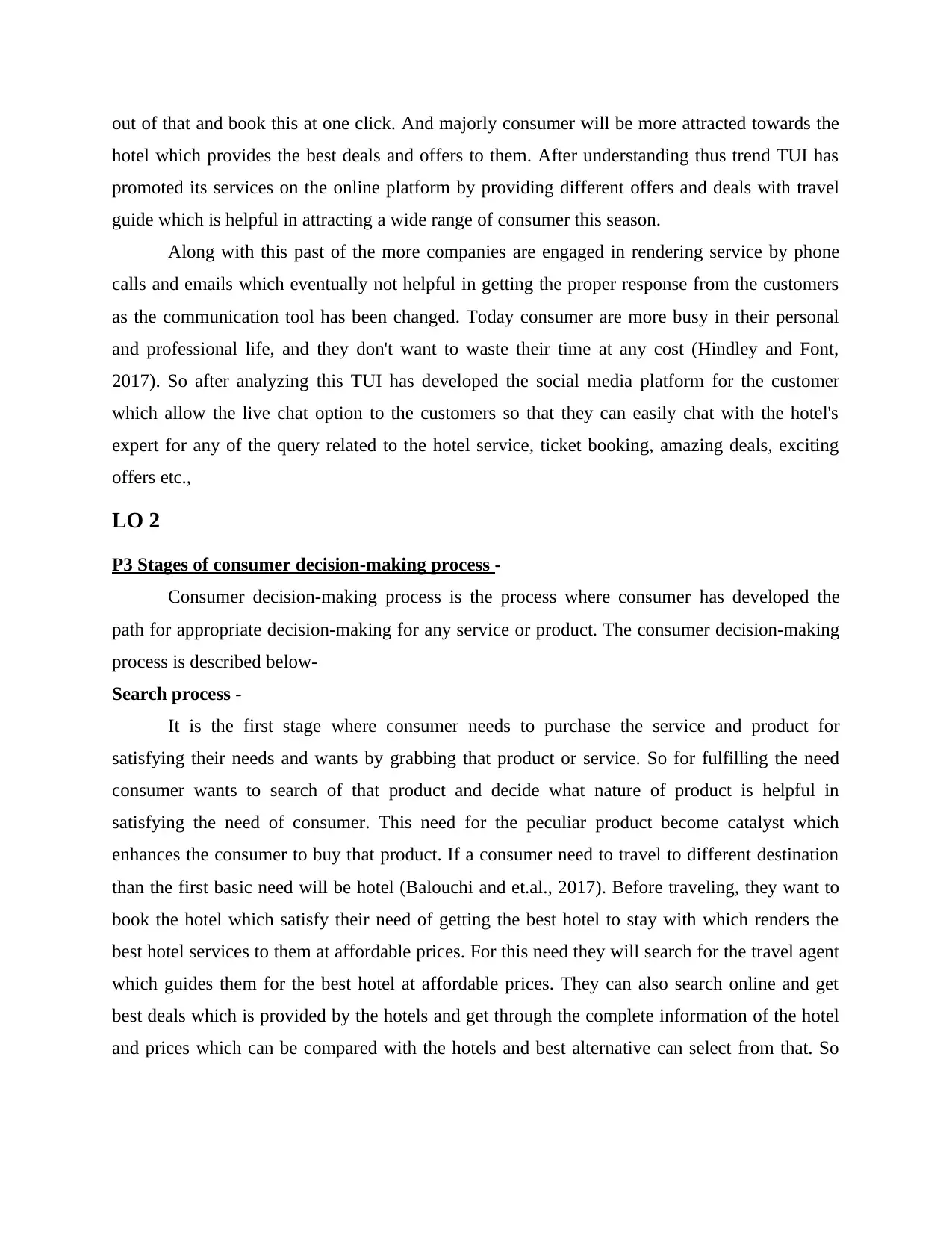
out of that and book this at one click. And majorly consumer will be more attracted towards the
hotel which provides the best deals and offers to them. After understanding thus trend TUI has
promoted its services on the online platform by providing different offers and deals with travel
guide which is helpful in attracting a wide range of consumer this season.
Along with this past of the more companies are engaged in rendering service by phone
calls and emails which eventually not helpful in getting the proper response from the customers
as the communication tool has been changed. Today consumer are more busy in their personal
and professional life, and they don't want to waste their time at any cost (Hindley and Font,
2017). So after analyzing this TUI has developed the social media platform for the customer
which allow the live chat option to the customers so that they can easily chat with the hotel's
expert for any of the query related to the hotel service, ticket booking, amazing deals, exciting
offers etc.,
LO 2
P3 Stages of consumer decision-making process -
Consumer decision-making process is the process where consumer has developed the
path for appropriate decision-making for any service or product. The consumer decision-making
process is described below-
Search process -
It is the first stage where consumer needs to purchase the service and product for
satisfying their needs and wants by grabbing that product or service. So for fulfilling the need
consumer wants to search of that product and decide what nature of product is helpful in
satisfying the need of consumer. This need for the peculiar product become catalyst which
enhances the consumer to buy that product. If a consumer need to travel to different destination
than the first basic need will be hotel (Balouchi and et.al., 2017). Before traveling, they want to
book the hotel which satisfy their need of getting the best hotel to stay with which renders the
best hotel services to them at affordable prices. For this need they will search for the travel agent
which guides them for the best hotel at affordable prices. They can also search online and get
best deals which is provided by the hotels and get through the complete information of the hotel
and prices which can be compared with the hotels and best alternative can select from that. So
hotel which provides the best deals and offers to them. After understanding thus trend TUI has
promoted its services on the online platform by providing different offers and deals with travel
guide which is helpful in attracting a wide range of consumer this season.
Along with this past of the more companies are engaged in rendering service by phone
calls and emails which eventually not helpful in getting the proper response from the customers
as the communication tool has been changed. Today consumer are more busy in their personal
and professional life, and they don't want to waste their time at any cost (Hindley and Font,
2017). So after analyzing this TUI has developed the social media platform for the customer
which allow the live chat option to the customers so that they can easily chat with the hotel's
expert for any of the query related to the hotel service, ticket booking, amazing deals, exciting
offers etc.,
LO 2
P3 Stages of consumer decision-making process -
Consumer decision-making process is the process where consumer has developed the
path for appropriate decision-making for any service or product. The consumer decision-making
process is described below-
Search process -
It is the first stage where consumer needs to purchase the service and product for
satisfying their needs and wants by grabbing that product or service. So for fulfilling the need
consumer wants to search of that product and decide what nature of product is helpful in
satisfying the need of consumer. This need for the peculiar product become catalyst which
enhances the consumer to buy that product. If a consumer need to travel to different destination
than the first basic need will be hotel (Balouchi and et.al., 2017). Before traveling, they want to
book the hotel which satisfy their need of getting the best hotel to stay with which renders the
best hotel services to them at affordable prices. For this need they will search for the travel agent
which guides them for the best hotel at affordable prices. They can also search online and get
best deals which is provided by the hotels and get through the complete information of the hotel
and prices which can be compared with the hotels and best alternative can select from that. So
⊘ This is a preview!⊘
Do you want full access?
Subscribe today to unlock all pages.

Trusted by 1+ million students worldwide
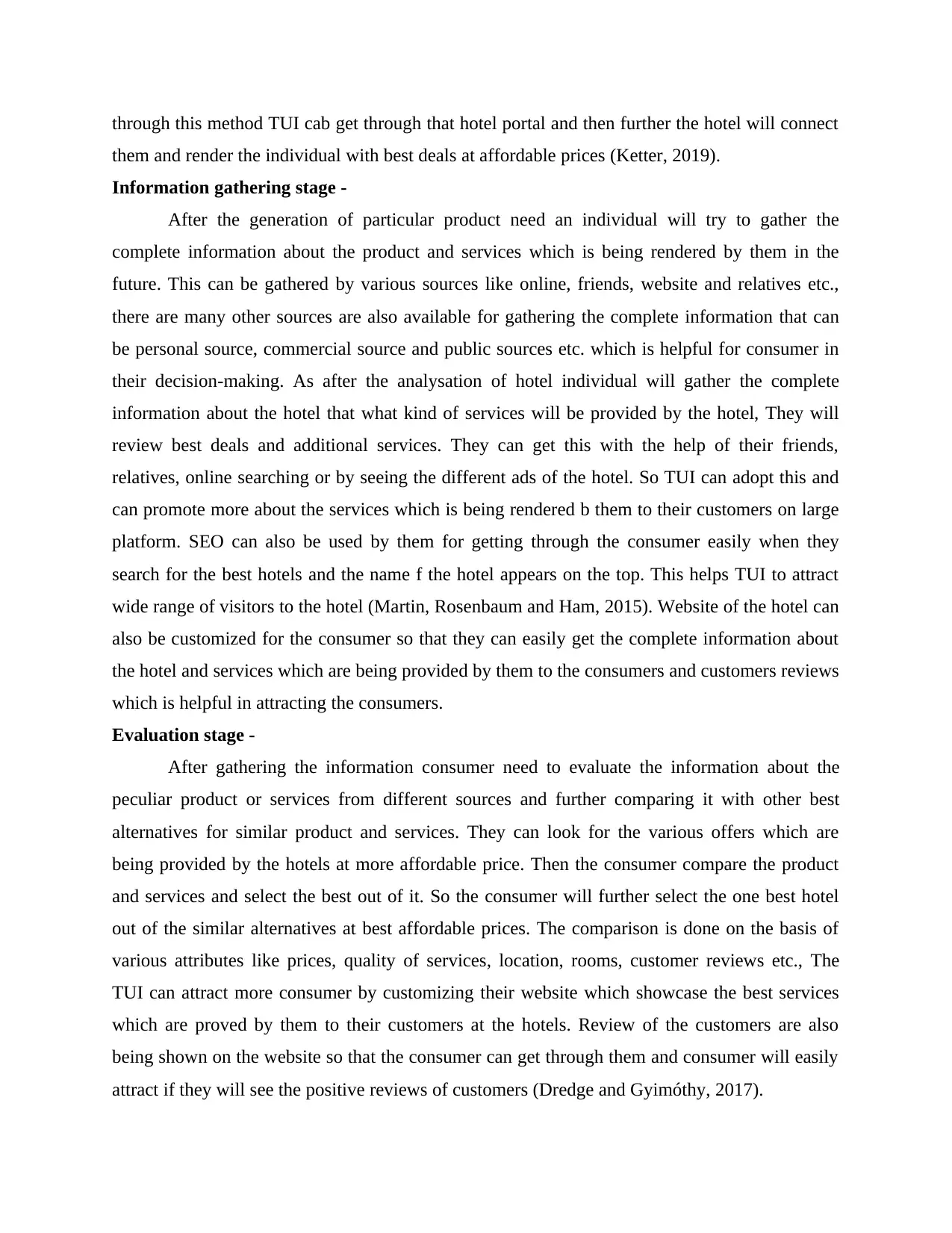
through this method TUI cab get through that hotel portal and then further the hotel will connect
them and render the individual with best deals at affordable prices (Ketter, 2019).
Information gathering stage -
After the generation of particular product need an individual will try to gather the
complete information about the product and services which is being rendered by them in the
future. This can be gathered by various sources like online, friends, website and relatives etc.,
there are many other sources are also available for gathering the complete information that can
be personal source, commercial source and public sources etc. which is helpful for consumer in
their decision-making. As after the analysation of hotel individual will gather the complete
information about the hotel that what kind of services will be provided by the hotel, They will
review best deals and additional services. They can get this with the help of their friends,
relatives, online searching or by seeing the different ads of the hotel. So TUI can adopt this and
can promote more about the services which is being rendered b them to their customers on large
platform. SEO can also be used by them for getting through the consumer easily when they
search for the best hotels and the name f the hotel appears on the top. This helps TUI to attract
wide range of visitors to the hotel (Martin, Rosenbaum and Ham, 2015). Website of the hotel can
also be customized for the consumer so that they can easily get the complete information about
the hotel and services which are being provided by them to the consumers and customers reviews
which is helpful in attracting the consumers.
Evaluation stage -
After gathering the information consumer need to evaluate the information about the
peculiar product or services from different sources and further comparing it with other best
alternatives for similar product and services. They can look for the various offers which are
being provided by the hotels at more affordable price. Then the consumer compare the product
and services and select the best out of it. So the consumer will further select the one best hotel
out of the similar alternatives at best affordable prices. The comparison is done on the basis of
various attributes like prices, quality of services, location, rooms, customer reviews etc., The
TUI can attract more consumer by customizing their website which showcase the best services
which are proved by them to their customers at the hotels. Review of the customers are also
being shown on the website so that the consumer can get through them and consumer will easily
attract if they will see the positive reviews of customers (Dredge and Gyimóthy, 2017).
them and render the individual with best deals at affordable prices (Ketter, 2019).
Information gathering stage -
After the generation of particular product need an individual will try to gather the
complete information about the product and services which is being rendered by them in the
future. This can be gathered by various sources like online, friends, website and relatives etc.,
there are many other sources are also available for gathering the complete information that can
be personal source, commercial source and public sources etc. which is helpful for consumer in
their decision-making. As after the analysation of hotel individual will gather the complete
information about the hotel that what kind of services will be provided by the hotel, They will
review best deals and additional services. They can get this with the help of their friends,
relatives, online searching or by seeing the different ads of the hotel. So TUI can adopt this and
can promote more about the services which is being rendered b them to their customers on large
platform. SEO can also be used by them for getting through the consumer easily when they
search for the best hotels and the name f the hotel appears on the top. This helps TUI to attract
wide range of visitors to the hotel (Martin, Rosenbaum and Ham, 2015). Website of the hotel can
also be customized for the consumer so that they can easily get the complete information about
the hotel and services which are being provided by them to the consumers and customers reviews
which is helpful in attracting the consumers.
Evaluation stage -
After gathering the information consumer need to evaluate the information about the
peculiar product or services from different sources and further comparing it with other best
alternatives for similar product and services. They can look for the various offers which are
being provided by the hotels at more affordable price. Then the consumer compare the product
and services and select the best out of it. So the consumer will further select the one best hotel
out of the similar alternatives at best affordable prices. The comparison is done on the basis of
various attributes like prices, quality of services, location, rooms, customer reviews etc., The
TUI can attract more consumer by customizing their website which showcase the best services
which are proved by them to their customers at the hotels. Review of the customers are also
being shown on the website so that the consumer can get through them and consumer will easily
attract if they will see the positive reviews of customers (Dredge and Gyimóthy, 2017).
Paraphrase This Document
Need a fresh take? Get an instant paraphrase of this document with our AI Paraphraser
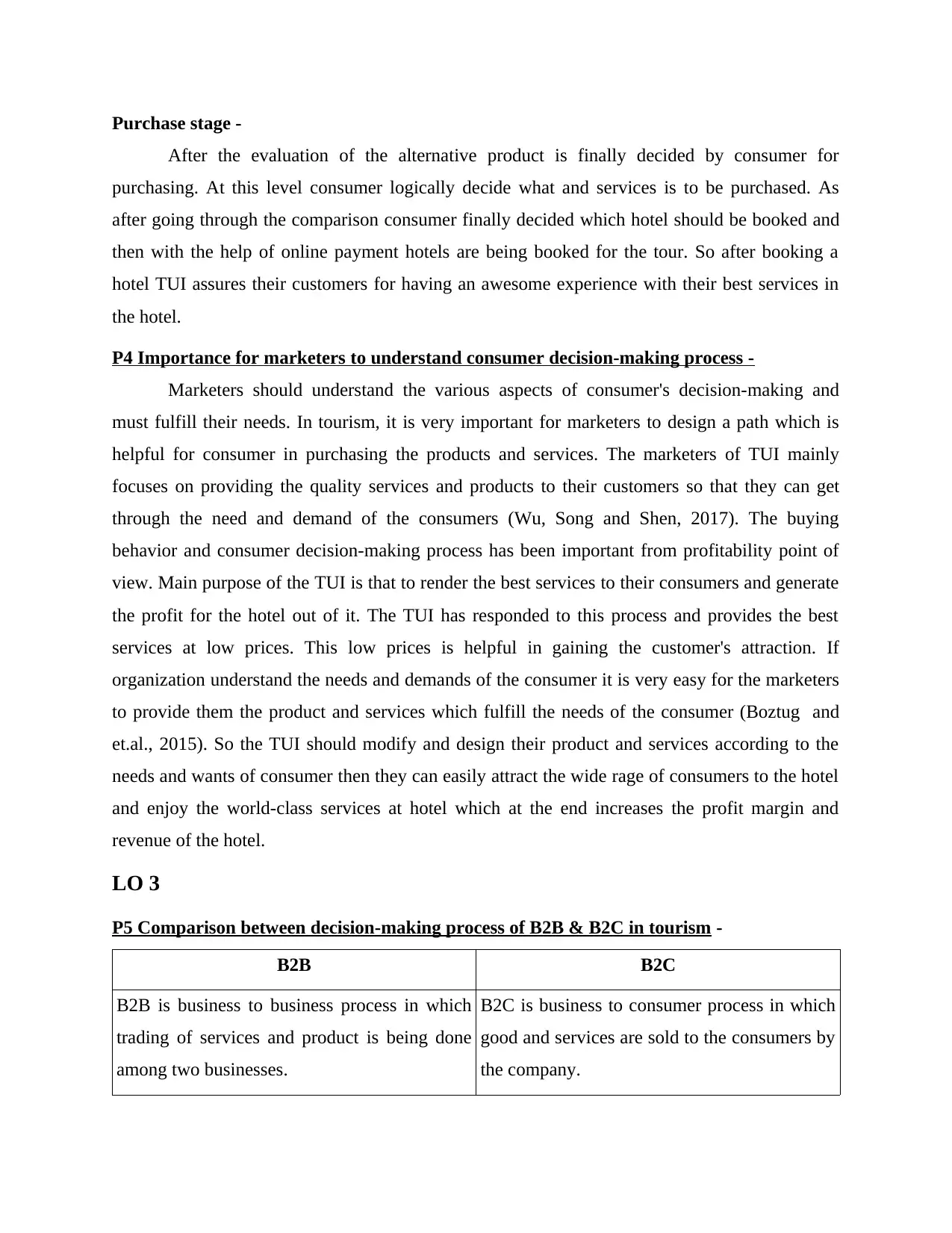
Purchase stage -
After the evaluation of the alternative product is finally decided by consumer for
purchasing. At this level consumer logically decide what and services is to be purchased. As
after going through the comparison consumer finally decided which hotel should be booked and
then with the help of online payment hotels are being booked for the tour. So after booking a
hotel TUI assures their customers for having an awesome experience with their best services in
the hotel.
P4 Importance for marketers to understand consumer decision-making process -
Marketers should understand the various aspects of consumer's decision-making and
must fulfill their needs. In tourism, it is very important for marketers to design a path which is
helpful for consumer in purchasing the products and services. The marketers of TUI mainly
focuses on providing the quality services and products to their customers so that they can get
through the need and demand of the consumers (Wu, Song and Shen, 2017). The buying
behavior and consumer decision-making process has been important from profitability point of
view. Main purpose of the TUI is that to render the best services to their consumers and generate
the profit for the hotel out of it. The TUI has responded to this process and provides the best
services at low prices. This low prices is helpful in gaining the customer's attraction. If
organization understand the needs and demands of the consumer it is very easy for the marketers
to provide them the product and services which fulfill the needs of the consumer (Boztug and
et.al., 2015). So the TUI should modify and design their product and services according to the
needs and wants of consumer then they can easily attract the wide rage of consumers to the hotel
and enjoy the world-class services at hotel which at the end increases the profit margin and
revenue of the hotel.
LO 3
P5 Comparison between decision-making process of B2B & B2C in tourism -
B2B B2C
B2B is business to business process in which
trading of services and product is being done
among two businesses.
B2C is business to consumer process in which
good and services are sold to the consumers by
the company.
After the evaluation of the alternative product is finally decided by consumer for
purchasing. At this level consumer logically decide what and services is to be purchased. As
after going through the comparison consumer finally decided which hotel should be booked and
then with the help of online payment hotels are being booked for the tour. So after booking a
hotel TUI assures their customers for having an awesome experience with their best services in
the hotel.
P4 Importance for marketers to understand consumer decision-making process -
Marketers should understand the various aspects of consumer's decision-making and
must fulfill their needs. In tourism, it is very important for marketers to design a path which is
helpful for consumer in purchasing the products and services. The marketers of TUI mainly
focuses on providing the quality services and products to their customers so that they can get
through the need and demand of the consumers (Wu, Song and Shen, 2017). The buying
behavior and consumer decision-making process has been important from profitability point of
view. Main purpose of the TUI is that to render the best services to their consumers and generate
the profit for the hotel out of it. The TUI has responded to this process and provides the best
services at low prices. This low prices is helpful in gaining the customer's attraction. If
organization understand the needs and demands of the consumer it is very easy for the marketers
to provide them the product and services which fulfill the needs of the consumer (Boztug and
et.al., 2015). So the TUI should modify and design their product and services according to the
needs and wants of consumer then they can easily attract the wide rage of consumers to the hotel
and enjoy the world-class services at hotel which at the end increases the profit margin and
revenue of the hotel.
LO 3
P5 Comparison between decision-making process of B2B & B2C in tourism -
B2B B2C
B2B is business to business process in which
trading of services and product is being done
among two businesses.
B2C is business to consumer process in which
good and services are sold to the consumers by
the company.
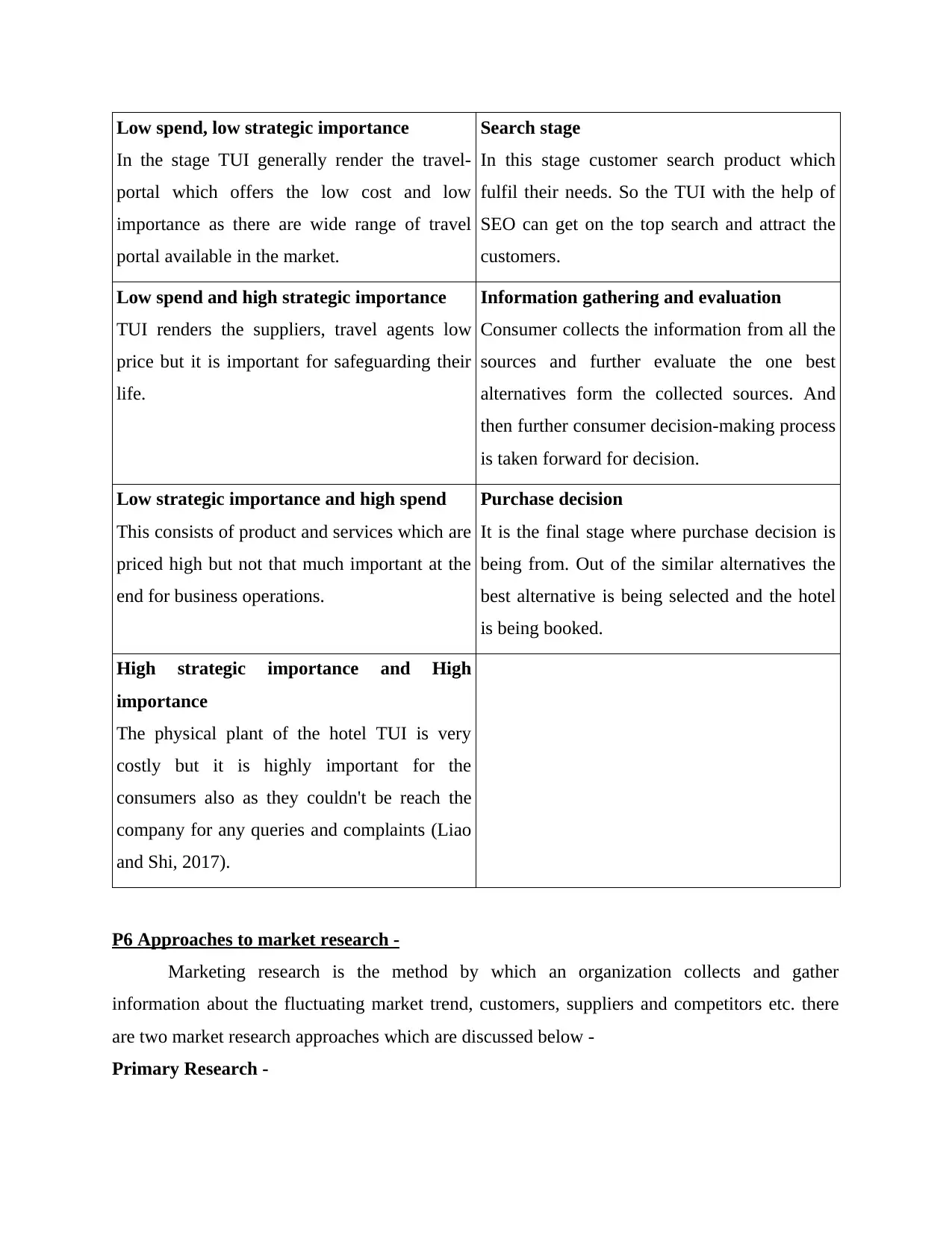
Low spend, low strategic importance
In the stage TUI generally render the travel-
portal which offers the low cost and low
importance as there are wide range of travel
portal available in the market.
Search stage
In this stage customer search product which
fulfil their needs. So the TUI with the help of
SEO can get on the top search and attract the
customers.
Low spend and high strategic importance
TUI renders the suppliers, travel agents low
price but it is important for safeguarding their
life.
Information gathering and evaluation
Consumer collects the information from all the
sources and further evaluate the one best
alternatives form the collected sources. And
then further consumer decision-making process
is taken forward for decision.
Low strategic importance and high spend
This consists of product and services which are
priced high but not that much important at the
end for business operations.
Purchase decision
It is the final stage where purchase decision is
being from. Out of the similar alternatives the
best alternative is being selected and the hotel
is being booked.
High strategic importance and High
importance
The physical plant of the hotel TUI is very
costly but it is highly important for the
consumers also as they couldn't be reach the
company for any queries and complaints (Liao
and Shi, 2017).
P6 Approaches to market research -
Marketing research is the method by which an organization collects and gather
information about the fluctuating market trend, customers, suppliers and competitors etc. there
are two market research approaches which are discussed below -
Primary Research -
In the stage TUI generally render the travel-
portal which offers the low cost and low
importance as there are wide range of travel
portal available in the market.
Search stage
In this stage customer search product which
fulfil their needs. So the TUI with the help of
SEO can get on the top search and attract the
customers.
Low spend and high strategic importance
TUI renders the suppliers, travel agents low
price but it is important for safeguarding their
life.
Information gathering and evaluation
Consumer collects the information from all the
sources and further evaluate the one best
alternatives form the collected sources. And
then further consumer decision-making process
is taken forward for decision.
Low strategic importance and high spend
This consists of product and services which are
priced high but not that much important at the
end for business operations.
Purchase decision
It is the final stage where purchase decision is
being from. Out of the similar alternatives the
best alternative is being selected and the hotel
is being booked.
High strategic importance and High
importance
The physical plant of the hotel TUI is very
costly but it is highly important for the
consumers also as they couldn't be reach the
company for any queries and complaints (Liao
and Shi, 2017).
P6 Approaches to market research -
Marketing research is the method by which an organization collects and gather
information about the fluctuating market trend, customers, suppliers and competitors etc. there
are two market research approaches which are discussed below -
Primary Research -
⊘ This is a preview!⊘
Do you want full access?
Subscribe today to unlock all pages.

Trusted by 1+ million students worldwide
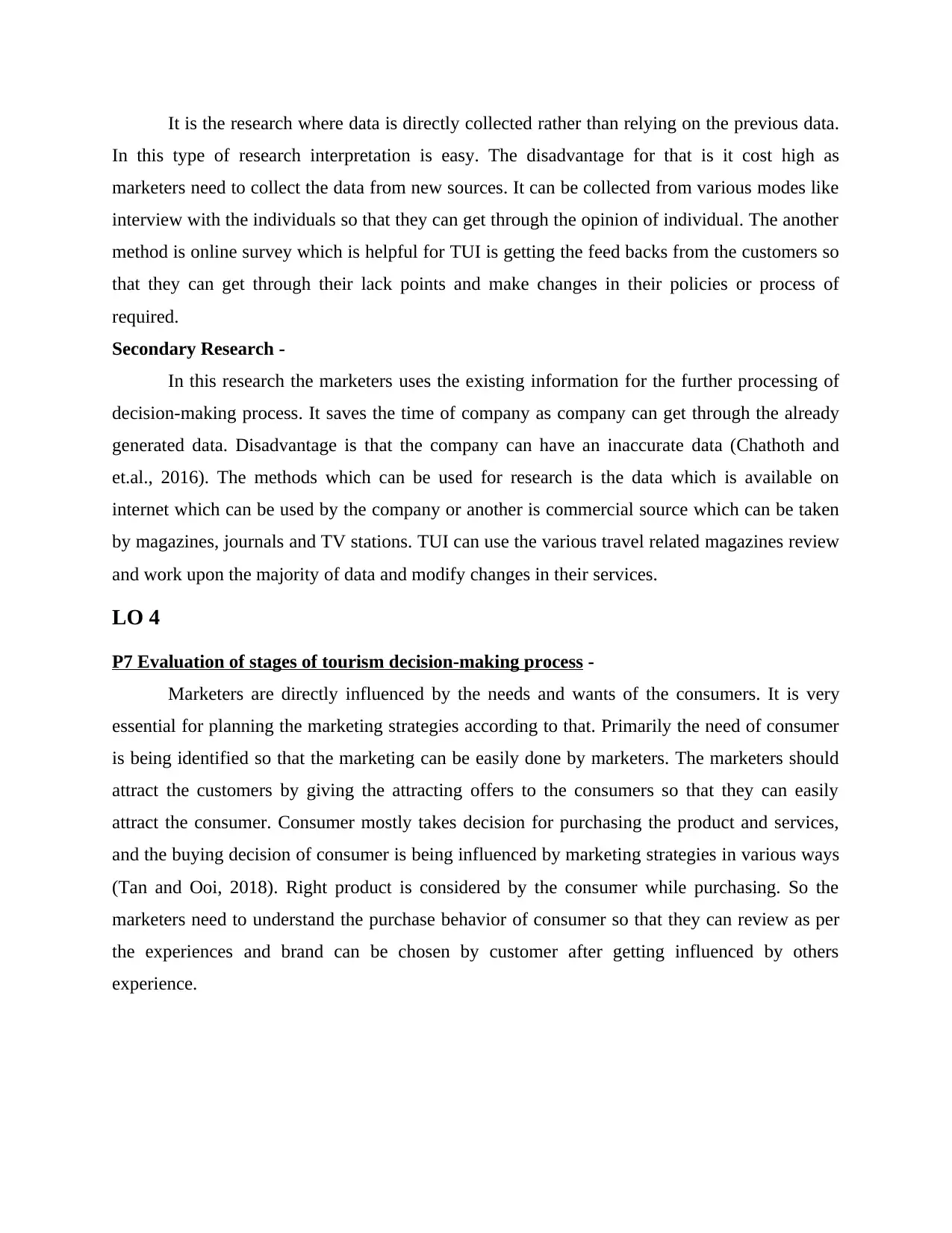
It is the research where data is directly collected rather than relying on the previous data.
In this type of research interpretation is easy. The disadvantage for that is it cost high as
marketers need to collect the data from new sources. It can be collected from various modes like
interview with the individuals so that they can get through the opinion of individual. The another
method is online survey which is helpful for TUI is getting the feed backs from the customers so
that they can get through their lack points and make changes in their policies or process of
required.
Secondary Research -
In this research the marketers uses the existing information for the further processing of
decision-making process. It saves the time of company as company can get through the already
generated data. Disadvantage is that the company can have an inaccurate data (Chathoth and
et.al., 2016). The methods which can be used for research is the data which is available on
internet which can be used by the company or another is commercial source which can be taken
by magazines, journals and TV stations. TUI can use the various travel related magazines review
and work upon the majority of data and modify changes in their services.
LO 4
P7 Evaluation of stages of tourism decision-making process -
Marketers are directly influenced by the needs and wants of the consumers. It is very
essential for planning the marketing strategies according to that. Primarily the need of consumer
is being identified so that the marketing can be easily done by marketers. The marketers should
attract the customers by giving the attracting offers to the consumers so that they can easily
attract the consumer. Consumer mostly takes decision for purchasing the product and services,
and the buying decision of consumer is being influenced by marketing strategies in various ways
(Tan and Ooi, 2018). Right product is considered by the consumer while purchasing. So the
marketers need to understand the purchase behavior of consumer so that they can review as per
the experiences and brand can be chosen by customer after getting influenced by others
experience.
In this type of research interpretation is easy. The disadvantage for that is it cost high as
marketers need to collect the data from new sources. It can be collected from various modes like
interview with the individuals so that they can get through the opinion of individual. The another
method is online survey which is helpful for TUI is getting the feed backs from the customers so
that they can get through their lack points and make changes in their policies or process of
required.
Secondary Research -
In this research the marketers uses the existing information for the further processing of
decision-making process. It saves the time of company as company can get through the already
generated data. Disadvantage is that the company can have an inaccurate data (Chathoth and
et.al., 2016). The methods which can be used for research is the data which is available on
internet which can be used by the company or another is commercial source which can be taken
by magazines, journals and TV stations. TUI can use the various travel related magazines review
and work upon the majority of data and modify changes in their services.
LO 4
P7 Evaluation of stages of tourism decision-making process -
Marketers are directly influenced by the needs and wants of the consumers. It is very
essential for planning the marketing strategies according to that. Primarily the need of consumer
is being identified so that the marketing can be easily done by marketers. The marketers should
attract the customers by giving the attracting offers to the consumers so that they can easily
attract the consumer. Consumer mostly takes decision for purchasing the product and services,
and the buying decision of consumer is being influenced by marketing strategies in various ways
(Tan and Ooi, 2018). Right product is considered by the consumer while purchasing. So the
marketers need to understand the purchase behavior of consumer so that they can review as per
the experiences and brand can be chosen by customer after getting influenced by others
experience.
Paraphrase This Document
Need a fresh take? Get an instant paraphrase of this document with our AI Paraphraser
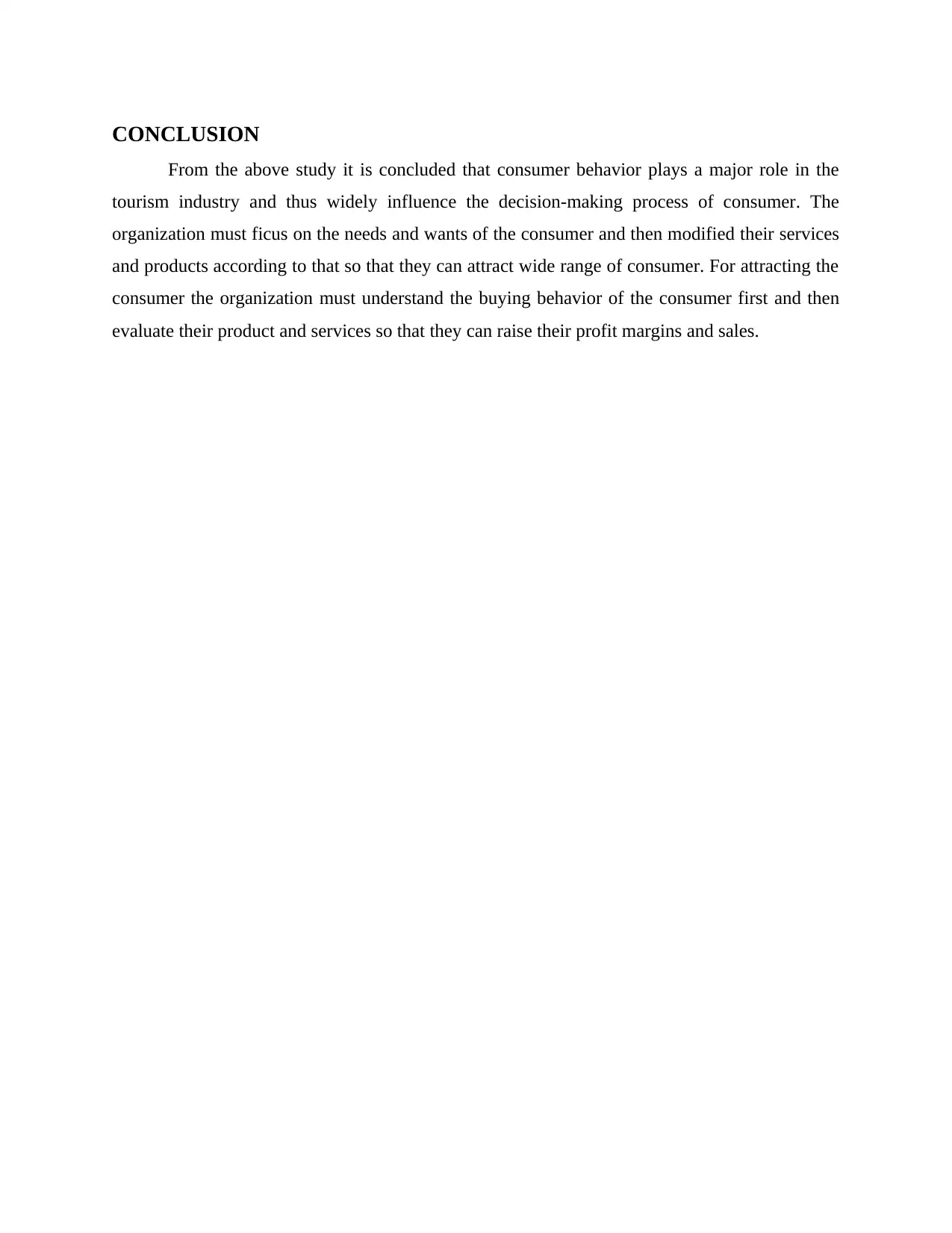
CONCLUSION
From the above study it is concluded that consumer behavior plays a major role in the
tourism industry and thus widely influence the decision-making process of consumer. The
organization must ficus on the needs and wants of the consumer and then modified their services
and products according to that so that they can attract wide range of consumer. For attracting the
consumer the organization must understand the buying behavior of the consumer first and then
evaluate their product and services so that they can raise their profit margins and sales.
From the above study it is concluded that consumer behavior plays a major role in the
tourism industry and thus widely influence the decision-making process of consumer. The
organization must ficus on the needs and wants of the consumer and then modified their services
and products according to that so that they can attract wide range of consumer. For attracting the
consumer the organization must understand the buying behavior of the consumer first and then
evaluate their product and services so that they can raise their profit margins and sales.
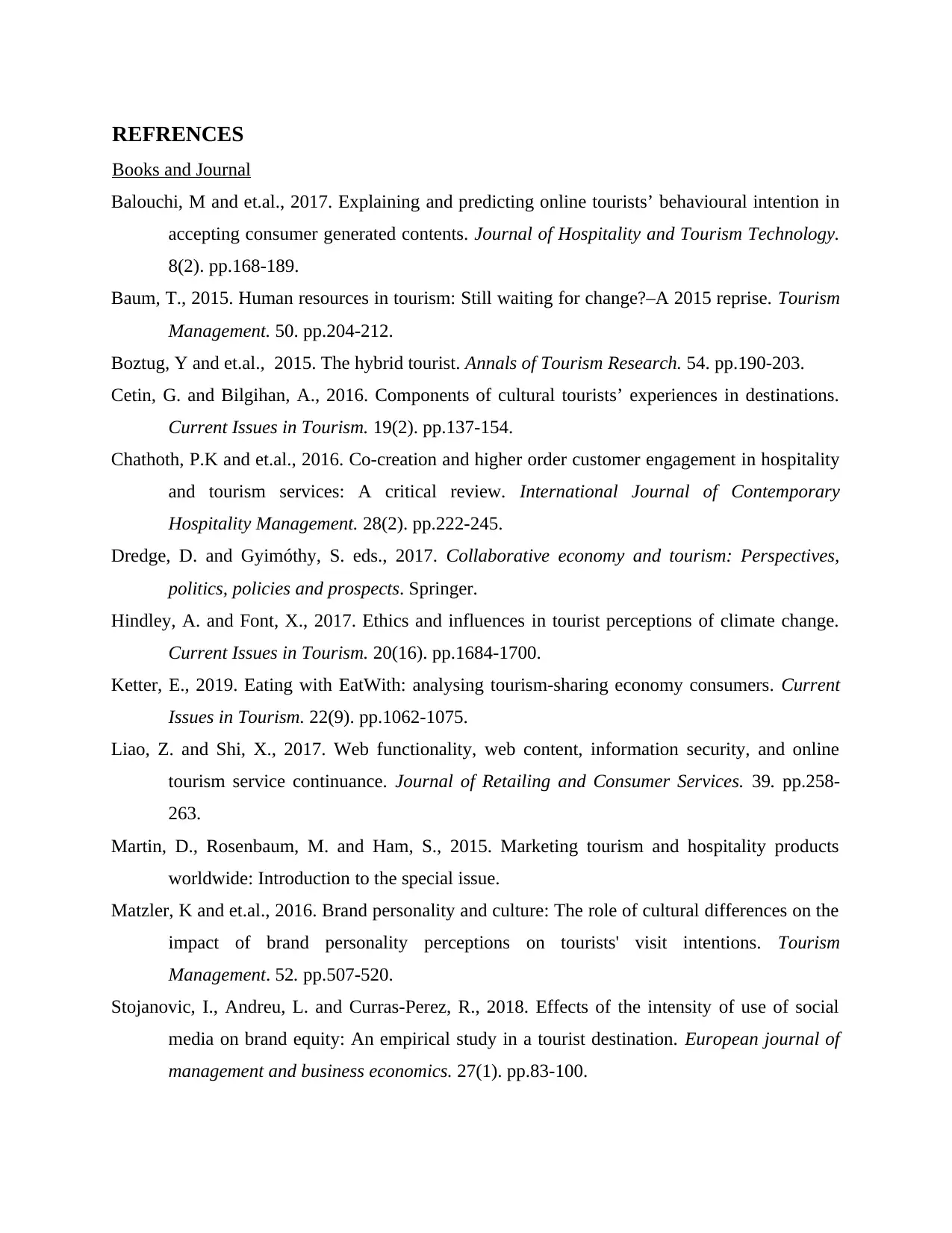
REFRENCES
Books and Journal
Balouchi, M and et.al., 2017. Explaining and predicting online tourists’ behavioural intention in
accepting consumer generated contents. Journal of Hospitality and Tourism Technology.
8(2). pp.168-189.
Baum, T., 2015. Human resources in tourism: Still waiting for change?–A 2015 reprise. Tourism
Management. 50. pp.204-212.
Boztug, Y and et.al., 2015. The hybrid tourist. Annals of Tourism Research. 54. pp.190-203.
Cetin, G. and Bilgihan, A., 2016. Components of cultural tourists’ experiences in destinations.
Current Issues in Tourism. 19(2). pp.137-154.
Chathoth, P.K and et.al., 2016. Co-creation and higher order customer engagement in hospitality
and tourism services: A critical review. International Journal of Contemporary
Hospitality Management. 28(2). pp.222-245.
Dredge, D. and Gyimóthy, S. eds., 2017. Collaborative economy and tourism: Perspectives,
politics, policies and prospects. Springer.
Hindley, A. and Font, X., 2017. Ethics and influences in tourist perceptions of climate change.
Current Issues in Tourism. 20(16). pp.1684-1700.
Ketter, E., 2019. Eating with EatWith: analysing tourism-sharing economy consumers. Current
Issues in Tourism. 22(9). pp.1062-1075.
Liao, Z. and Shi, X., 2017. Web functionality, web content, information security, and online
tourism service continuance. Journal of Retailing and Consumer Services. 39. pp.258-
263.
Martin, D., Rosenbaum, M. and Ham, S., 2015. Marketing tourism and hospitality products
worldwide: Introduction to the special issue.
Matzler, K and et.al., 2016. Brand personality and culture: The role of cultural differences on the
impact of brand personality perceptions on tourists' visit intentions. Tourism
Management. 52. pp.507-520.
Stojanovic, I., Andreu, L. and Curras-Perez, R., 2018. Effects of the intensity of use of social
media on brand equity: An empirical study in a tourist destination. European journal of
management and business economics. 27(1). pp.83-100.
Books and Journal
Balouchi, M and et.al., 2017. Explaining and predicting online tourists’ behavioural intention in
accepting consumer generated contents. Journal of Hospitality and Tourism Technology.
8(2). pp.168-189.
Baum, T., 2015. Human resources in tourism: Still waiting for change?–A 2015 reprise. Tourism
Management. 50. pp.204-212.
Boztug, Y and et.al., 2015. The hybrid tourist. Annals of Tourism Research. 54. pp.190-203.
Cetin, G. and Bilgihan, A., 2016. Components of cultural tourists’ experiences in destinations.
Current Issues in Tourism. 19(2). pp.137-154.
Chathoth, P.K and et.al., 2016. Co-creation and higher order customer engagement in hospitality
and tourism services: A critical review. International Journal of Contemporary
Hospitality Management. 28(2). pp.222-245.
Dredge, D. and Gyimóthy, S. eds., 2017. Collaborative economy and tourism: Perspectives,
politics, policies and prospects. Springer.
Hindley, A. and Font, X., 2017. Ethics and influences in tourist perceptions of climate change.
Current Issues in Tourism. 20(16). pp.1684-1700.
Ketter, E., 2019. Eating with EatWith: analysing tourism-sharing economy consumers. Current
Issues in Tourism. 22(9). pp.1062-1075.
Liao, Z. and Shi, X., 2017. Web functionality, web content, information security, and online
tourism service continuance. Journal of Retailing and Consumer Services. 39. pp.258-
263.
Martin, D., Rosenbaum, M. and Ham, S., 2015. Marketing tourism and hospitality products
worldwide: Introduction to the special issue.
Matzler, K and et.al., 2016. Brand personality and culture: The role of cultural differences on the
impact of brand personality perceptions on tourists' visit intentions. Tourism
Management. 52. pp.507-520.
Stojanovic, I., Andreu, L. and Curras-Perez, R., 2018. Effects of the intensity of use of social
media on brand equity: An empirical study in a tourist destination. European journal of
management and business economics. 27(1). pp.83-100.
⊘ This is a preview!⊘
Do you want full access?
Subscribe today to unlock all pages.

Trusted by 1+ million students worldwide
1 out of 13
Related Documents
Your All-in-One AI-Powered Toolkit for Academic Success.
+13062052269
info@desklib.com
Available 24*7 on WhatsApp / Email
![[object Object]](/_next/static/media/star-bottom.7253800d.svg)
Unlock your academic potential
Copyright © 2020–2026 A2Z Services. All Rights Reserved. Developed and managed by ZUCOL.





